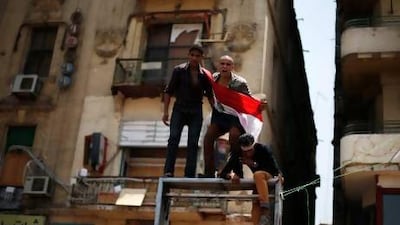CAIRO // Conspicuous amid the mostly festive scenes in Egypt's massive demonstrations on Sunday and yesterday was a re-emergence of support from protesters for the military and the police.
The contrast is remarkable. This time last year, protesters were chanting against the military generals, who badly mismanaged the country after Hosni Mubarak resigned in 2011 until Mr Morsi was elected. Demonstrators often clashed with the police in the streets.
In the latest demonstrations, protesters held placards reading "The army, people and police are one hand". When the military sent four helicopters in a low-flying circuit over Tahrir Square on Sunday, the crowds erupted in cheers.
And when the tens of thousands of protesters occupying the square heard yesterday that the military had issued a 48-hour ultimatum for "the people's demands to be met" or else the army would be "obliged by its patriotic and historic responsibilities ... to announce a road map for the future," they applauded and chanted in favour of the generals that they were so eager to get rid of in 2012.
Near the presidential palace on Sunday, protesters exhorted a group of armed men in civilian dress seated in a police truck to join in chants claiming that the police stand with the people.
Nearby, Hanaa Kamal, a 47-year-old homemaker, said she voted for Mr Morsi but he lost her support after he "sold the nation".
"The millions that have descended into the street have the army and police behind them as we confront the American agents," she shouted, referring to the Muslim Brotherhood.
Outside the ministry of defence, protesters gathered under posters of Abdel Fattah Al Sisi, the country's highest-ranking military officer, calling for his support. Those gathered were convinced that the army would intervene on their behalf.
A man in a military uniform was carried on the shoulders of demonstrators as they chanted, and women waving Egyptian flags sang to military personnel entering and leaving the ministry.
"The army isn't on anybody's side but the Egyptian people," said Mohamed Ali Sayyed Ahmed, 48, a small-business owner. He came to ask the army to "recover the dignity and character of Egypt".
Protesters at the palace were also confident that their presence would convince the military to pressure Mr Morsi to resign, or at least make significant concessions. In the lead-up to the protests, which have been planned for several weeks, Mr Morsi gave a speech admitting mistakes and promising constitutional amendments.
"I hope [General] Sisi will listen to the protesters and do something for Egypt," said Ahmed Mohamed, a 30-year-old protester near the palace. "I accept one thing only, and that's the success of the revolution."
Many commentators and politicians feared the protesters would clash with police during the latest unrest, but the fearsome, black-clad riot police have so far refused to engage with protesters. Some have even joined the protests against Mr Morsi.
A video posted on the Egyptian news website El Badil showed police officers in uniform chanting: "We'll die while the nation lives."
Armoured police vans near Tahrir Square were seen with stickers and flags that said, "The people and the police". Nearby, the burnt-out chassis of police vehicles destroyed in previous clashes have yet to be moved.
Meanwhile, the founder of an Egyptian protest movement which brought millions out to demand President Mohammed Morsi resign said on Monday he welcomed an ultimatum from the army to politicians and urged people to rally again until Mr Morsi quit. Mahmoud Badr, of the "Tamarud - Rebel!" coalition told a televised news conference: "The statement of the armed forces has a single idea - supporting the will of the Egyptian people at this moment, which means early presidential elections."
Islamists have also taken note of the security services' flirtation with the protesters. As some of Mr Morsi's supporters of indulged on mango ice cream, other young men drilled in preparation for what some thought was an imminent attack by elements they claimed were part of the old regime.
One column of at least 200 men at the entrance to an area where pro-Morsi groups were demonstrating was armed with pipes, clubs and sticks, carrying home-made shields and protective gear used for martial-arts sparring.
Mahmoud Abouel Naga, a 22-year-old from Sharqeya governate at Rabaa Adaweya Mosque in eastern Cairo, pointed to reports of the police joining protesters in clashes with the Muslim Brotherhood, using birdshot and tear gas. He was sure that in the case of an attack, Morsi supporters would be on their own.
*With additional reporting from Reuters
foreign.desk@thenational.ae
twitter: For breaking news from the Gulf, the Middle East and around the globe follow The National World. Follow us

